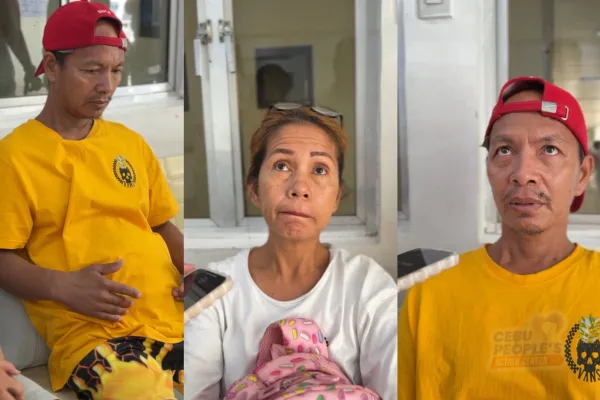
Free Appendix Surgery in Bogo City Highlights Cebu’s Zero-Billing Healthcare Policy
Bogo City, Cebu – For Kuya Roel and his wife Charry, what began as a health emergency turned into a story of gratitude and relief, thanks to Cebu’s zero-billing healthcare policy championed by Governor Pam Baricuatro.
Earlier this month, Kuya Roel was rushed to a hospital after suffering severe abdominal pain. Doctors confirmed a ruptured appendix, a life-threatening condition that required immediate surgery. For many in similar situations, the fear of hospital bills can delay treatment—but in this case, timely medical intervention came without the financial burden.
Fear of the Bill Almost Delayed the Surgery
Before learning about the provincial government’s healthcare initiative, the couple hesitated to seek hospital care, worried that the cost of surgery and hospitalization would be beyond their means. Like many working-class families, the prospect of debt loomed heavily over their decision-making.
However, after hearing from neighbors about Governor Baricuatro’s healthcare programs—particularly the zero-billing policy—they decided to proceed with a check-up. Medical tests confirmed the urgent need for an appendectomy, and doctors immediately prepared Roel for surgery.
“Wala gyud mi gibayran bisan piso,” Charry said, smiling as she recounted the relief of leaving the hospital without a single peso charged to their name.

A Life-Saving Operation at No Cost
The appendectomy was successful, and Roel is now on the road to recovery. Hospital staff emphasized that under the zero-billing program, patients in qualifying hospitals receive full coverage for approved medical procedures, ensuring that no Cebuano has to choose between health and financial stability.
According to the Department of Health (DOH), appendicitis is one of the most common surgical emergencies in the Philippines, and timely intervention can mean the difference between life and death. In rural and low-income communities, delayed treatment due to financial worries remains a major contributor to complications.
The Provincial Government’s Commitment to Accessible Healthcare
Governor Pam Baricuatro has repeatedly stated that quality medical care should be available to all Cebuanos, regardless of economic status. The zero-billing initiative is one of her administration’s flagship policies, designed to remove the cost barrier that prevents many from seeking timely treatment.
Working alongside her daughter, Dr. Nikki Catalan, who serves as a Public Health Consultant, the Governor has expanded partnerships with hospitals and clinics to implement this policy across the province. Their joint efforts focus not only on free surgical procedures but also on preventive care, health screenings, and wellness campaigns.
Data from the Philippine Statistics Authority shows that medical expenses are among the leading causes of household debt in the country. By covering the cost of essential medical procedures, Cebu’s program aims to reduce both health risks and financial strain.
A Broader Impact on Public Health
Public health experts emphasize that removing cost as a barrier encourages early treatment, reduces complications, and lowers overall healthcare expenses in the long term. When residents feel confident they can access hospital services without debt, they are more likely to seek medical attention at the first sign of illness.
A report from the World Health Organization notes that universal health coverage is a critical factor in improving life expectancy and quality of life, especially in regions where poverty limits access to care.
The Role of CPAC in Outreach and Awareness
The Cebu People’s Action Center (CPAC) plays a vital role in bringing these healthcare programs closer to communities. Through field visits, medical missions, and local health screenings, CPAC ensures that residents know their healthcare rights and the services available to them.
For Roel and Charry, the information they received from community members and local officials was the bridge between fear and treatment. Without awareness of the policy, they might have continued to delay medical care, risking severe complications.
Healthcare as a Right, Not a Privilege
Governor Baricuatro’s administration frames healthcare not as a benefit but as a right. This philosophy underpins the provincial government’s investments in public hospitals, medical equipment, and training for health workers.
While challenges remain—such as ensuring adequate staffing in rural areas and sustaining funding for the zero-billing program—the success stories emerging from communities like Bogo City provide a compelling argument for its continuation and expansion.
Looking Ahead
For Roel, recovery now means more time with his family and a return to daily life without the shadow of hospital debt. For Cebu Province, his case serves as a living example of how policy can translate into tangible, life-changing outcomes.
As more residents learn about the zero-billing healthcare policy, the hope is that no Cebuano will suffer—or worse, die—because of fear of medical costs.
Conclusion
The story of Kuya Roel is a testament to what can happen when public policy aligns with the needs of ordinary citizens. In Cebu, the zero-billing healthcare program is not just an administrative directive—it is a lifeline for families who would otherwise face impossible choices.
Through the combined efforts of Governor Pam Baricuatro, Dr. Nikki Catalan, CPAC, and dedicated healthcare workers, the promise of accessible, quality healthcare is becoming a reality for Cebuanos from all walks of life. And for Roel and Charry, it is a promise that quite literally saved a life.
